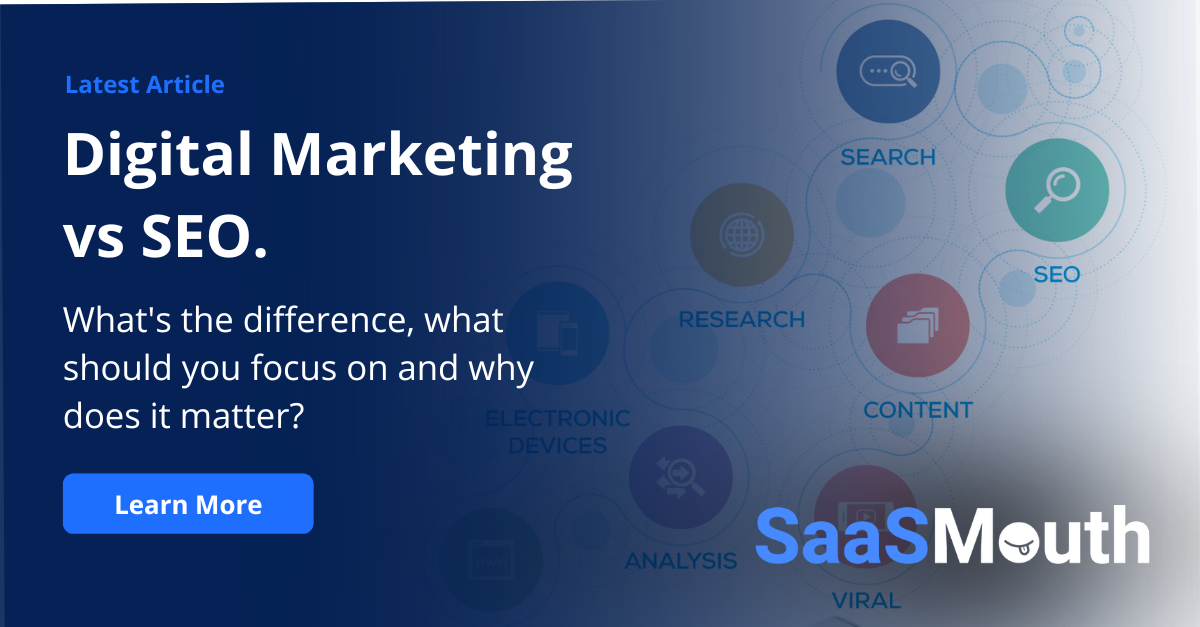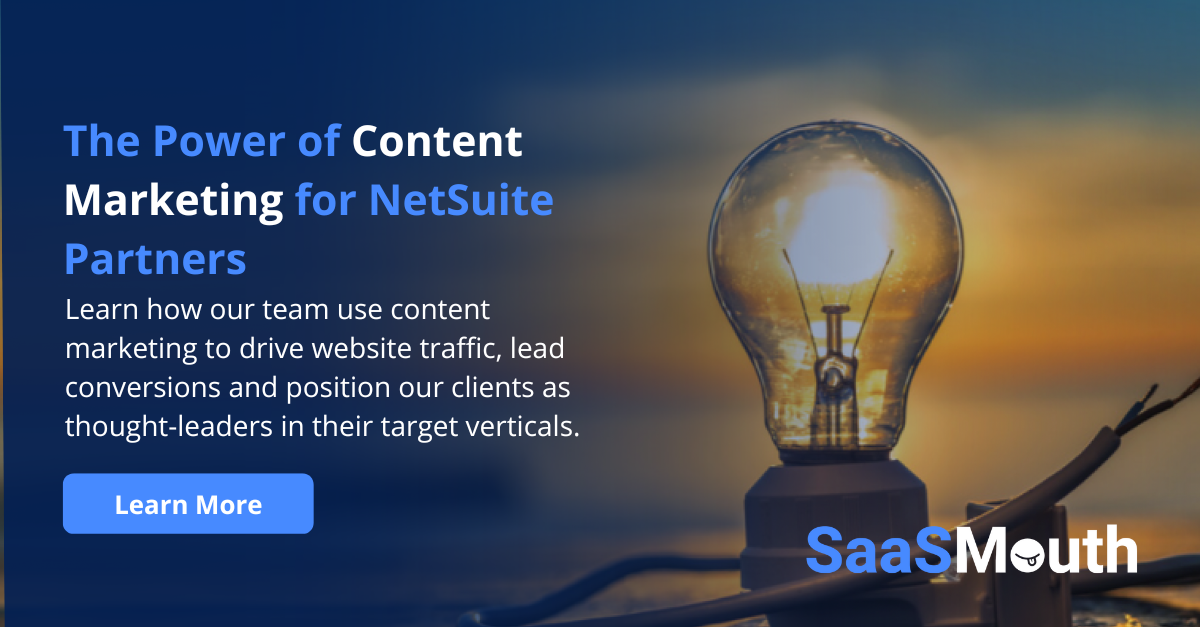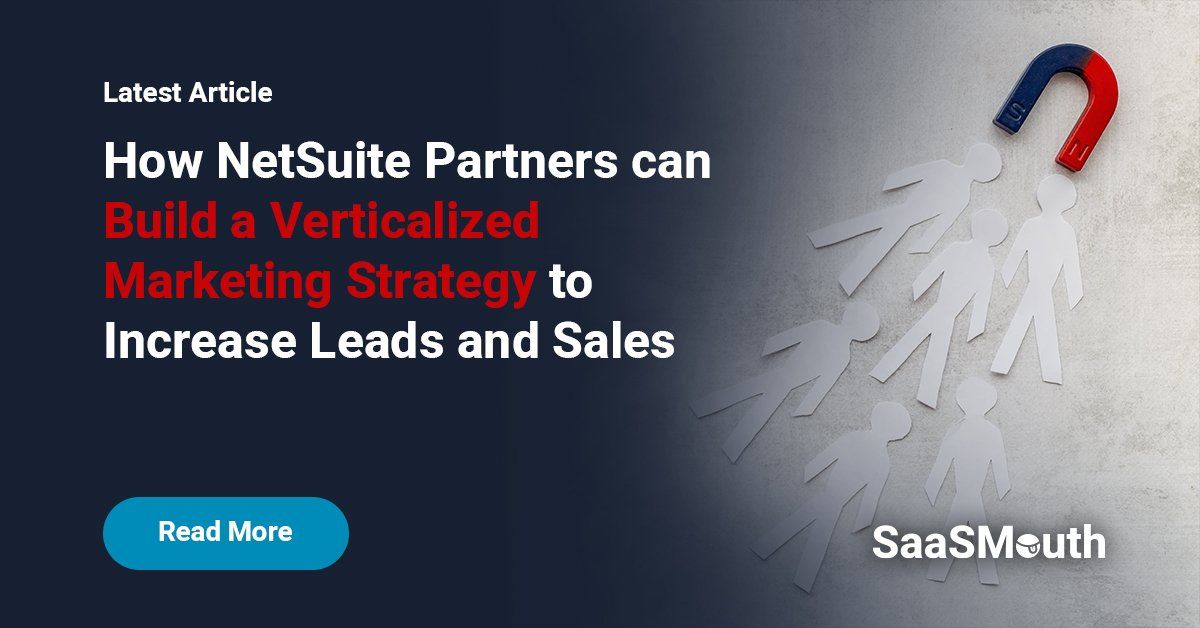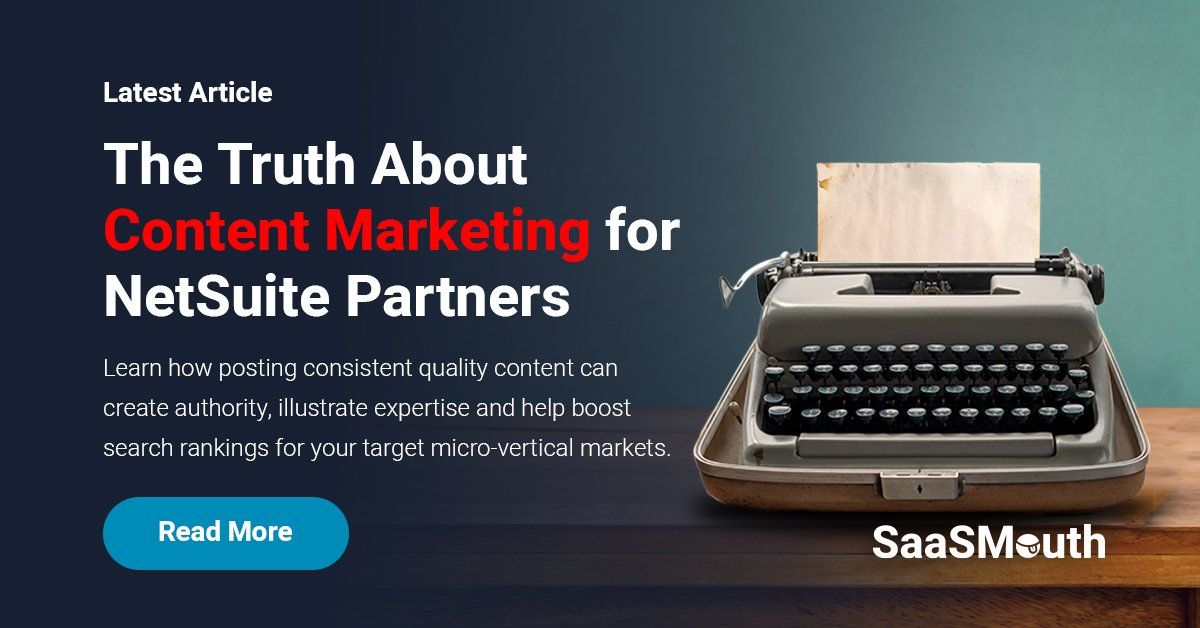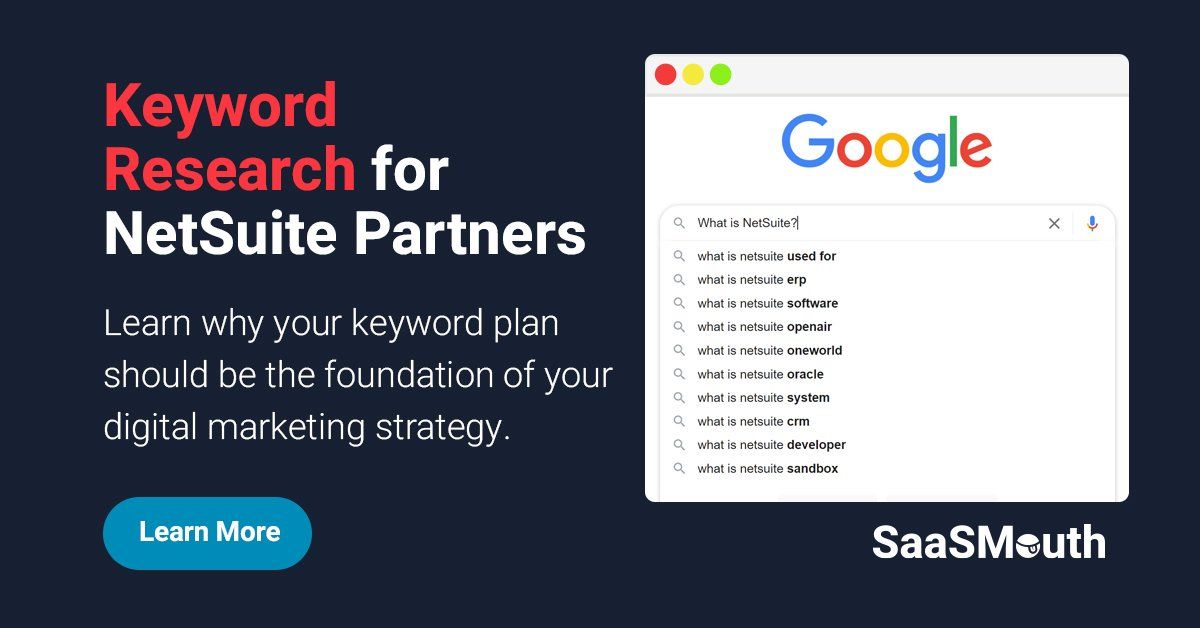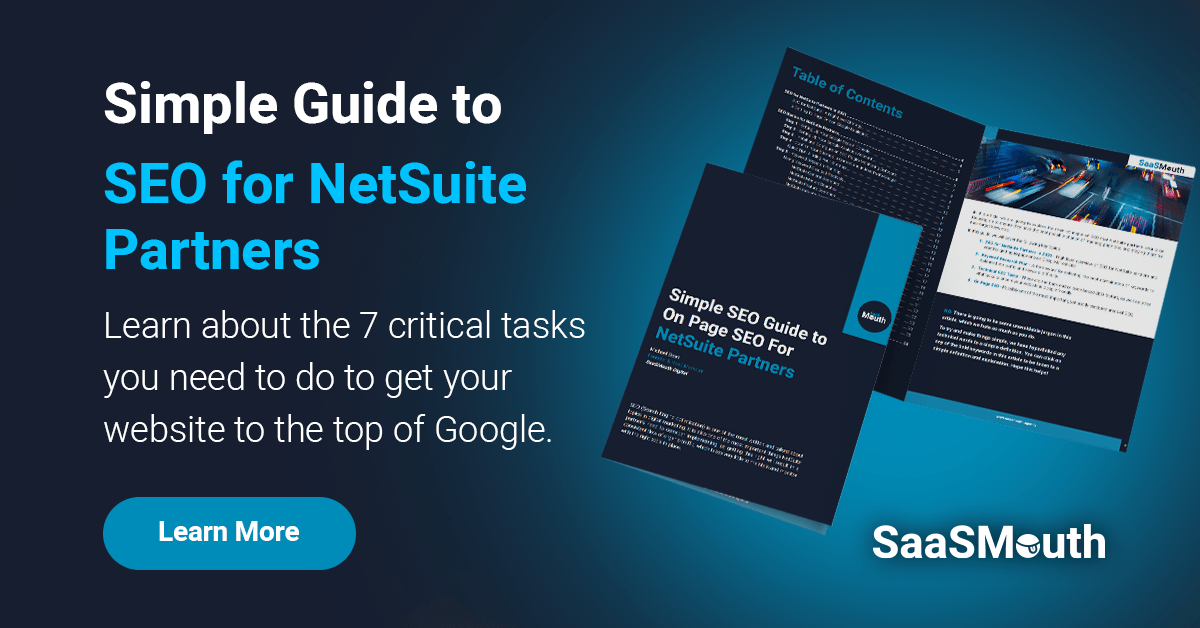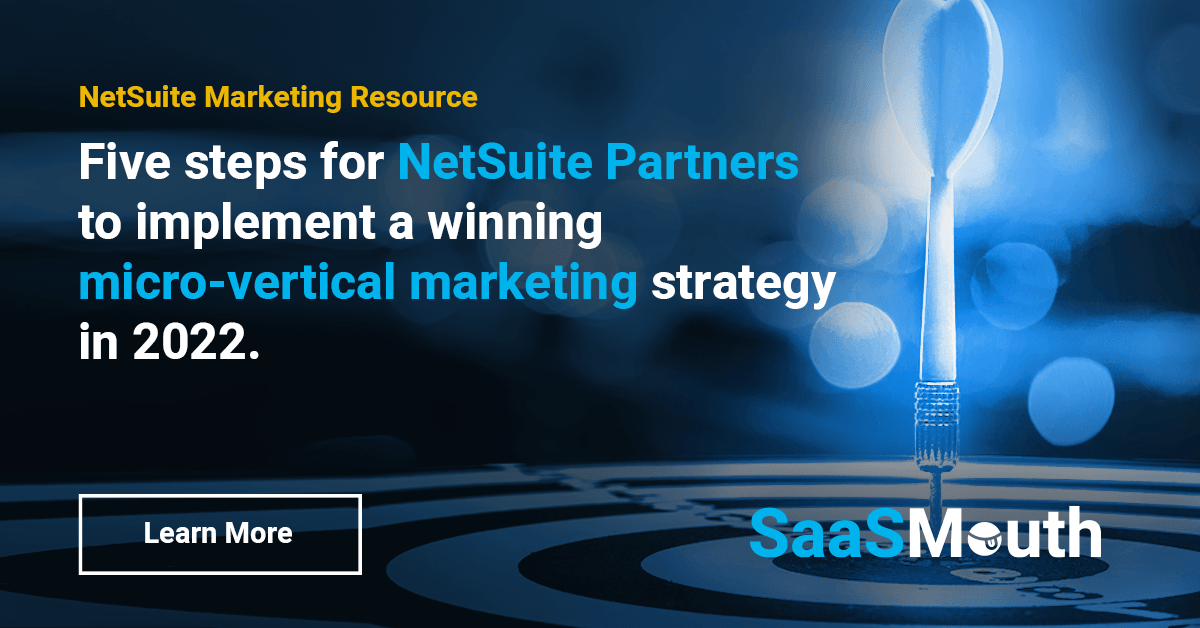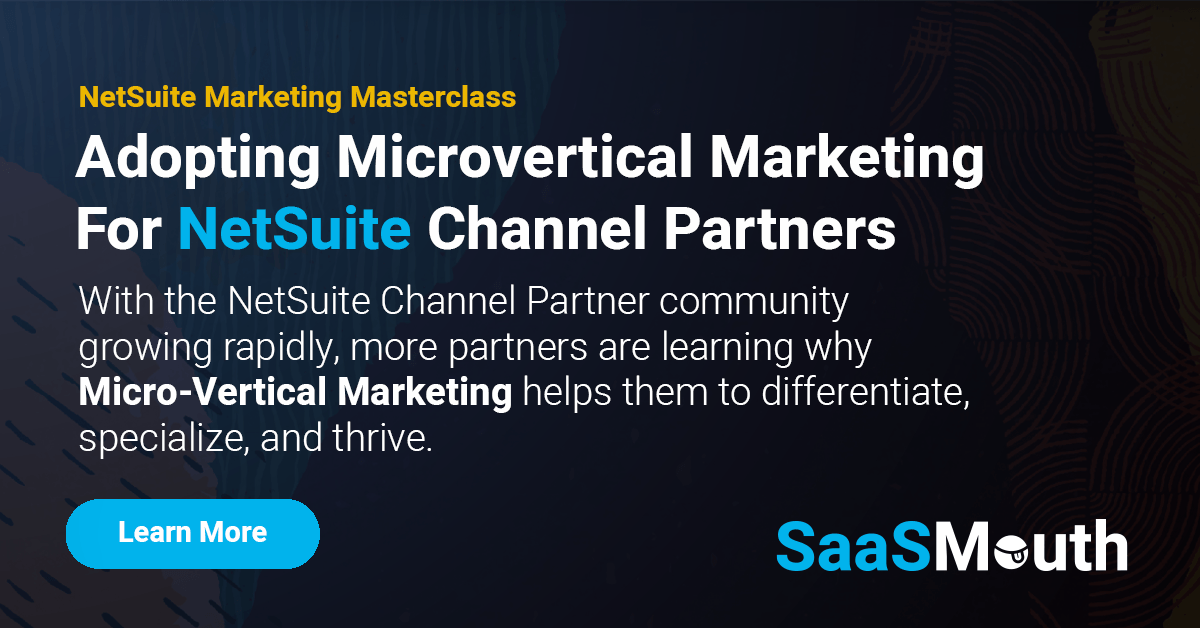My Largely Unpopular Opinion on Marketing ERP Solutions and What NetSuite Partners Can Do to Differentiate.
As marketers, it is our responsibility to generate high quality inbound leads through cost effective channels with the intent of having these leads convert into active opportunities, and with the right sales approach, high value customers.
I speak with a lot of different ERP solution providers and partners (mostly from the NetSuite Channel) about their marketing efforts, and usually, they are all experiencing the same key problems across lead generation, content creation and messaging distribution:
Lead Generation Challenges
- Not enough inbound leads being generated for the level of effort and spend they are putting into their marketing engine.
- Low quality leads who are not ready to start a buying cycle.
- Attracting difficult clients who are wanting their new ERP to be customised to within an inch of its life to suit their existing processes (or to function just as their old software did.
- Losing leads to competitors due to non-service/capability related reasons, such as preliminary discount offers from competitors.
Marketing Content Challenges
- Internal marketing teams do not understand the ERP product, or their customer’s industries well enough to create engaging and accurate marketing messaging en masse.
- External agencies are geared towards B2C marketing tactics and don’t understand the challenge of generating low volume, high value marketing leads.
Marketing Message Distribution Challenges
- Marketing campaigns are not engaging and do not generate enough interest, engagement and conversion.
- Distribution channels, such as LinkedIn, are already washed out with competitor messaging.
- Low conversion from traffic to website and relevant landing pages.
If any of these challenges strikes a chord with you, read on to learn our tactics for increasing social engagement, driving more traffic to your website, converting more website users through effective content and call to actions, and how to ensure your website receives a consistent flow of traffic from non marketing campaign originated events.
Right Place, Right Time, Right Message
Now, this is where my opinion of marketing ERP solutions start’s to test the conventional discussion around the importance of messaging and engagement.
I don’t want to come across too black and white with this, but for the overwhelming majority of people who see your marketing messaging, unless they have a serious pain point that is important enough for them to want to put the effort and resources in solving, they are not going to convert on your campaign regardless of how clever, convincing or enticing your message is.
Your message might be interesting enough to get a click, and get them back to your landing pages for a deeper dive into the solution you are offering, but unless they are already in an active buying cycle, or are about to get into one, there’s not really anything you can say or do to convince them they need to invest upwards of $50k for a new ERP implementation, or to replace their existing system, if they are not already in that mindset.
In addition to this, unless you are showing them something they haven't seen before, from either NetSuite themselves or other partners, there isn’t a lot you can do to differentiate your offering from that of your competitors.
So as Marketers, What Do We Do?
Now that we have accepted the fact that we are marketing to a very small percentage of the overall market who are in the right mindset, how do we ensure our messaging gets in front of them, that they engage with the campaign, and convert?
At SaaSMouth, we approach our clients digital marketing engine set up with a few things in mind:
- Focussing hyper-specific micro-verticals
- Frequency of Messaging/Campaigning
- Building marketing campaigns around satisfying the prospects core needs
- Ensuring our messaging is getting in front of the right people through the use of targeted audiences
Choose Your Target and Focus
If your marketing campaigns are built around the same vertical market’s that your ERP vendor is targeting, you're in for an uphill battle. Chances are, they have a lot for authority and history as experts in their own product, and outranking them will be next to impossible. To add to the pain, you are not only trying to compete with the ERP vendors themselves, but hundreds of other partners who are targeting the same markets as well.
At SaaSMouth, we work with NetSuite partners who have been able to add undeniable value to the core NetSuite vertical solutions by building functionality, modules, apps and automations that enhance and transform the NetSuite platform into a solution that is highly aligned for their target markets.
Some Examples of Successful Partners Who Have a Micro-Vertical Focus
WeighPay have built a comprehensive integration to their Hybrid Cloud Weight-focused purchasing and sales platform, to create a single ecosystem of technologies for the Scrap Metal, Recycling and Waste Management industries.
Blu Banyan have gone above and beyond in creating advanced modules and tools that offer Solar Installation companies with a single platform of technology that is pre-integrated to some of the leading solar industry point solutions out of the box.
Crafted ERP, have taken NetSuite Food and Beverage Edition, and built advanced features and modules that are created to solve the real world challenges of Wineries, Breweries, Distilleries and other Beverage Manufacturing verticals.
These partners are consistently successful in both lead generation and sales conversion, because they are offering their target market enhanced solutions (that even NetSuite themselves cant offer), built specifically for their needs, rather than generic vertical ERP solutions that realistically look the same regardless of which partner they choose.
So, What Do We Do if We Don’t Have Enhancements for a Specific Micro-Vertical?
The truth is, you don’t need a long list of enhancements to step outside the box and start presenting your solutions in a way that speaks to a specific micro-vertical. NetSuite already suits the needs of hundreds of micro-verticals out of the box. However, most partner’s are stuck in the mind-set of marketing to high search volume verticals, such as retail, wholesale distribution and manufacturing which are becoming increasingly competitive markets with an audience that is fatigued by the same messaging.
When onboarding our clients, we seek to learn about their existing customer list, and try to identify successful implementations where NetSuite has provided an ideal solution for the client as well as any customisations or enhancements that were built for that project. From there, we think about what micro-vertical market they sit in, and identify how many similar businesses exist in the target market. If the numbers stack up, the solution is solid, and the industry is not being aggressively targeted, then we know we’ve found a great potential micro-vertical.
Packaging Companies - A Real World Example
A real world example of this would be for potential NetSuite prospects in the packaging industry. NetSuite Wholesale Distribution Edition will do what the packaging industry needs 95% out of the box with the remaining 5% gap being closed with simple customisations, saved searches and reports. Now that we are confident in our solution, we can start building a digital marketing engine to attract prospects from this industry.
Step 1. Confirm Search Volumes & Keyword Competitiveness
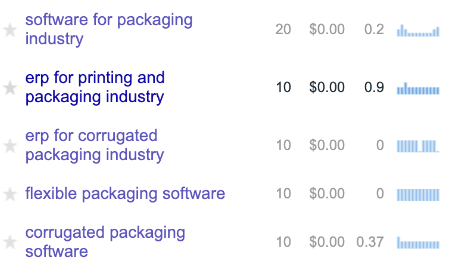
It goes without saying that building a digital marketing engine around an industry that has zero search volume is not a good use of marketing effort. However, most industries will have some search volume that is super specific to their micro-vertical. The thing with search volumes is that their power is compounded and recurring.
In the image above, we can see that from the top 5 (out of 50) searches for the packaging industry, there is a minimum of around 60 searches per month in the USA. That’s 720 searches per year for just 5 keywords. It is also important to note that the competition for these keywords, when compared to, ERP for Wholesale Distribution is dramatically lower.
At an average on page conversion rate of 2%, this traffic could bring your NetSuite practice 15 leads per year. At an average close rate of 20% and average deal value of $60k, this could bring your practice upwards of $400k in combined licence and implementation fees in year one alone.
Step 2. Define and Document the Solution
Working with your solutions consultants, define the ideal NetSuite solution for your micro-vertical. This should include NetSuite Editions, modules and features, any customisations or enhancements that will need to be considered as well as third party apps and integrations that would be of benefit to this industry.
Once you have this list, we can commence creating the marketing messaging matrix for this vertical.
What is a Marketing Messaging Matrix?
A marketing messaging matrix is the bible for your go to market approach for the selected micro-vertical. At SaaSMouth we build comprehensive MMM’s at the beginning of the project to simplify our marketing efforts in the future. The MMM becomes your playbook for creating almost any marketing related campaign or asset. From target persona’s, core needs, module mix, and feature lists, our Micro-vertical MMM gives us the springboard for every campaign. It also helps to create a strong go to market tone, that is consistent, replicable and reusable across a wide range of marketing campaigns and channels.
Step 3. Building Your Landing Pages, Lead Magnets and Content Calendar
By having a dedicated micro-vertical landing page on your website that speaks specifically to the needs of the industry, you are giving yourself the best chance of reaching #1 on Google, and claiming the traffic for this micro-vertical.
In addition to this, having a dedicated landing page for that micro-vertical increases the impact of your marketing messaging both directly, in how you explore the features and benefits of the solution, and indirectly, by providing a subconscious alignment and affinity for your visitors, by using familiar imagery, wording, industry speak and really highlighting the pain points that are most affecting your target market.
Think about it this way. If you were the CFO of a growing packaging company, would you be more responsive to a landing page about ERP for Packaging Companies, or ERP for Wholesale Distribution? How as a visitor, would you consume information and visuals when you can see packaging products in the imagery, such as on dashboards and screenshots?
Would you be more likely to contact a vendor, or submit your details to download their product guide if it was “A Guide to ERP for Packaging Companies” or “A Guide to ERP for Wholesalers”
The Feature, Benefit, Business Outcome, Personal Outcome Approach
As most marketers know, focusing on features when building marketing campaigns is fairly ineffective when it comes to gaining the attention of your target audience. Yes, there are a few key features of NetSuite that are genuinely game changing and industry leading, however the truth is, most of it, at first glance all looks the same to a potential prospect.
This is where Feature, Benefit, Business Outcome, Personal Outcome messaging comes in. (We made this up, it's not a thing, it’s just our thing.)
It’s easy to talk about a feature. It's harder to talk about the benefits these features offer companies and users. It’s even harder to highlight the real world business outcomes of these features, such as increased profits, increased efficiencies or lower times to close month end books, but it’s even harder again to pinpoint the personal connection a reader/visitor feels, when reading about the previous points.
To get the attention of your audience, you need to think about the person. We have a mantra at SaaSMouth when reviewing our marketing campaigns that we like to come back to.
“Companies don’t buy NetSuite. People buy NetSuite”
When we look at our campaigns through that lens, it becomes much easier to create compelling, accurate and effective campaigns that convert.
Step 4. Build Your Custom Audience, Post and Promote
When following a micro-vertical marketing approach, we are able to tightly define and identify key target companies within that industry. There are also a number of tools available to make building a comprehensive list of companies and people who fit into this industry easy.
LinkedIn, and other advertising platforms allow us to upload a list of target companies, match their employees and users, and ensure that any promoted posts is only shown to them, rather than using the broad audience categories that are traditionally used to narrow audience targets.
This approach results in lower cost campaigns, that you know are getting in front of the right people, which higher conversion rates. This is because, for the user, everything about the campaign feels as though it is speaking directly to them in their language, their industry, their problems and challenges.
Step 5. Become a Micro-vertical Industry Thought Leader
Consistent content is hugely important to building, maintaining and growing your audience. Not only does content create interest, build awareness and drive traffic, but it also helps to build your authority with Google on a particular topic or micro vertical.
Anyone can build a 20 page website, and the truth is most NetSuite partners already have. However, websites with 200, 300 or even 500 pages perform consistently better in search rankings than their lower page count counterparts.
Now, we are not suggesting you need to do this overnight. It would be a huge task to try to bring this much content to market in a short period of time. However, consistent posting of high quality, well written, search engine friendly articles, blogs and thought leadership pieces can quickly add up and bulk out your website with authority building content. We suggest at a minimum, you should release at least 2 articles per month focusing on your top priorities in terms of target audience. Another key point is that these articles should have carefully planned internal links to your keystone pages, as this tells Google which pages are most important to your overall website strategy.
Not only do these articles give you additional pages to rank for long-tail and less competitive keywords, but they also build your site's authority on topics that are key. These articles should also be substantial. At SaaSMouth, we believe one 3000 word will give better long term ROI and results than ten 300 word articles, as Google’s algorithm generally considers pages that are light on content to be less likely to give searches the answers to their questions, and as such, less likely to rank highly.
Step 6. Lather, Rinse, Repeat
Once you have built your landing page, marketing collateral, set up your call to actions and lead magnet downloads, realistically 80% of the work is done. Of course, there is always more work to do, but just getting this key foundation live, with a focus on posting and promoting social media campaigns is all you need to do to maintain the vertical.
Posts, articles and blogs relevant to your micro-vertical will generate a steady stream of traffic, and leads through CTA conversions and you will see over time that as your authority on the vertical grows, so too will your rankings, traffic and conversions.
A solid micro vertical, with decent search volume should be generating 10 to 15 leads per month.
Where To From Here?
That is entirely up to you. If what I have written about in this article has resonated, I would love to talk about it with you in person. Whether you’d like to discuss working with us, or just want to talk about NetSuite marketing tactics, and the results some of our clients have had by implementing this approach, we’d love to hear from you.
SaaSMouth offers our clients a wide range of marketing services, from single article creation, through to fully managed turnkey marketing campaigns, and everything in between. If you’re interested in learning more, book a free 30 minute session to discuss your current marketing efforts, your goals, and how we can help you increase traffic, convert more visitors, generate more leads and bulk up your sales pipeline.
We’re here to help.

Book A Free 30 Minute Consultation with Our NetSuite Marketing Expert
Michael Dean
NetSuite Marketing Expert
Follow Us on LinkedIn For More NetSuite Marketing Advice
Michael is a NetSuite marketing specialist, with over 10 years of experience in designing, planning, creating and executing marketing campaigns that drive traffic, generate leads and get results. We work with NetSuite Partners worldwide to help them define their micro-vertical targets, design their NetSuite solutions and create digital marketing engines that move away from “random acts of marketing” and towards strategic, repeatable and measurable results.
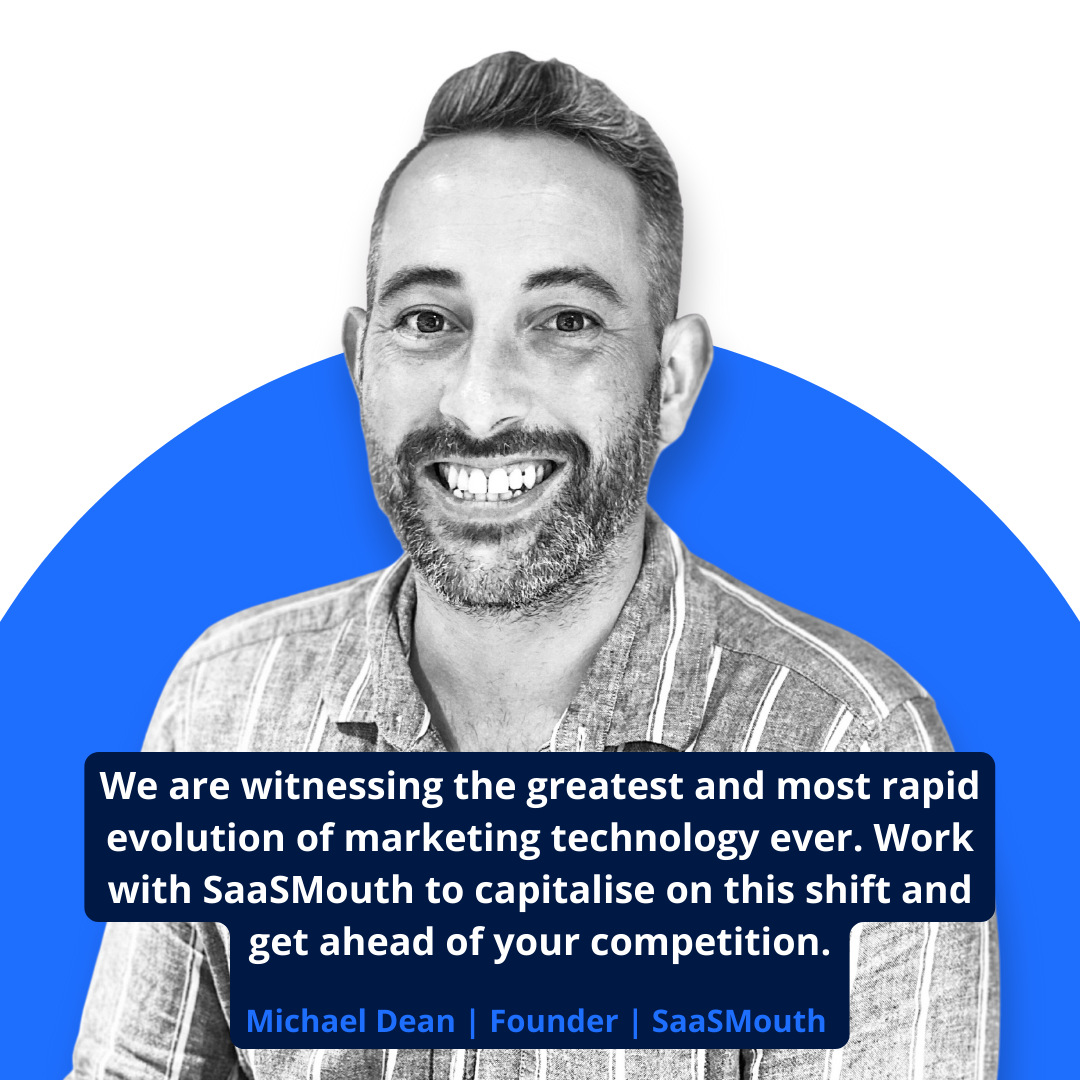
Let's Connect
Michael Dean
Head of Content & Founder, SaaSMouth
Michael Dean is the founder of SaaSMouth, a cutting-edge digital marketing agency dedicated to empowering SaaS companies and ERP partners with the power of AI, automation, and generative technologies. With twenty years of experience in digital marketing and ERP sales, Michael has developed a deep understanding of the unique challenges faced by SaaS Software vendors and ERP resellers and has devoted his career to creating innovative solutions that help them thrive in the digital space.
Recognising the immense potential of artificial intelligence and automation in marketing, Michael founded SaaSMouth to bridge the gap between traditional marketing approaches and the rapidly evolving landscape of the software industry.
Under Michael's leadership, SaaSMouth has become a pioneer in its field, leveraging state-of-the-art AI-driven tools to provide personalised, data-driven marketing solutions that maximise ROI and drive exponential growth for clients.

